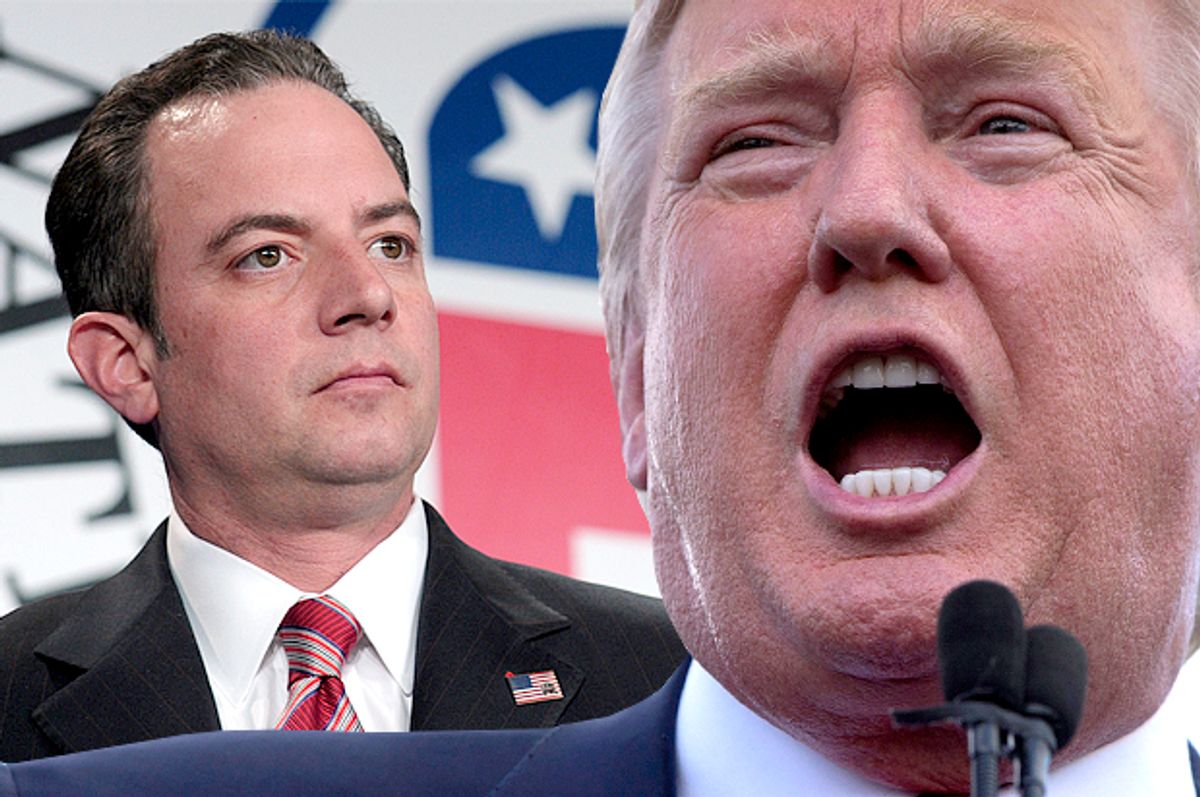Way back in August of 2015, when Scott Walker was still running for the White House and the Marco Moment was an as-yet unobserved phenomenon, all the top-tier Republican presidential candidates gathered together on stage for the first time to debate. Fox News’ Bret Baier kicked off the questioning by asking the candidates to raise their hands if they were “unwilling tonight to pledge your support to the eventual nominee of the Republican Party and pledge to not run an independent campaign against that person.” No candidate raised a hand, save one: the person at the center of the stage, Donald Trump.
Smirking as the crowd booed, Trump stuck his stubby finger in the eyes of the party establishment, saying that “if I’m the nominee, I will pledge I will not run as an independent.” But, he elaborated, he wasn’t going to promise to give away his endorsement and his base of support and get nothing in return. “I am discussing it with everybody,” Trump said, “but I’m, you know, talking about a lot of leverage.”
Trump, for all his shortcomings, is no dope. He did have leverage – he had surged to a commanding lead in the polls and was dominating all the media coverage. And, recognizing the advantage he had over the Republican National Committee, he exerted it and forced them to accommodate him. The Republican National Committee, wary of Trump’s influence, drafted a pledge and sent it around to the candidates asking them to promise not to run a third-party campaign if they didn’t win the GOP nomination. Trump signed it, but only after securing a meeting with RNC chair Reince Priebus. “I just wanted fairness from the Republican Party,” Trump explained while making a big show of signing the pledge.
He had forced the RNC and all the other candidates to promise to support him if he won the nomination. That fact undercut all the candidates efforts to derail Trump as he started winning – they called him a disaster and warned that he’d be toxic for the party if he secured the nomination, but they still adhered to their pledge and vowed to support “the party’s nominee,” even if it was Trump.
Trump, meanwhile, never intended to honor the pledge. He just wanted to push the RNC around, and he gave himself an out by insisting on continued “fairness” – a metric only he knew the definition of. And, at Tuesday night’s CNN candidate forum, Trump finally announced that he was breaking it. “I have been treated very unfairly,” he told Anderson Cooper, “by, basically, the RNC, the Republican Party, the establishment.”
With Trump no longer even paying lip service to the idea that he’d be loyal to the party, the GOP faces zero good options going forward. The idea behind the pledge was to keep Trump in line if, as everyone assumed when the pledge was signed, his candidacy faltered and he began losing. They didn’t want Trump siphoning off votes from the GOP as a third-party candidate. Now, as the party establishment and the non-Trump’s scheme for ways to game the nominating convention to lock Trump out and elevate a less toxic candidate, they have to worry about Trump’s hold over the throngs of voters who have supported him in the primaries. He’s already warned that “riots” will break out if he’s denied the nomination despite leading in the delegate count, but even if that doesn’t happen, he can still tell his supporters that they’ve been screwed over by the GOP and should stay home on Election Day.
The way to avoid all this, of course, is to let Trump have the nomination. But that’s just a different road to the same destination: likely Republican defeat in November and a complete crack-up of the Republican coalition. Trump’s already terrible favorability numbers have somehow dipped even lower of late, and there are even worries now that putting Trump at the top of the GOP ticket would imperil the Republicans majority in the House, which was assumed to be unassailable. Electoral carnage of that sort would leave the party shattered, leaderless, and at war with itself.
Of course, there’s always a small chance that Trump could run as a Republican and win. But that would also be a disaster for the Republicans, it that it would very likely be a disaster for the American system of government. That means the best hope for the GOP going forward is that the country would somehow survive the presidency of the authoritarian con man it installed as its nominee.

Shares